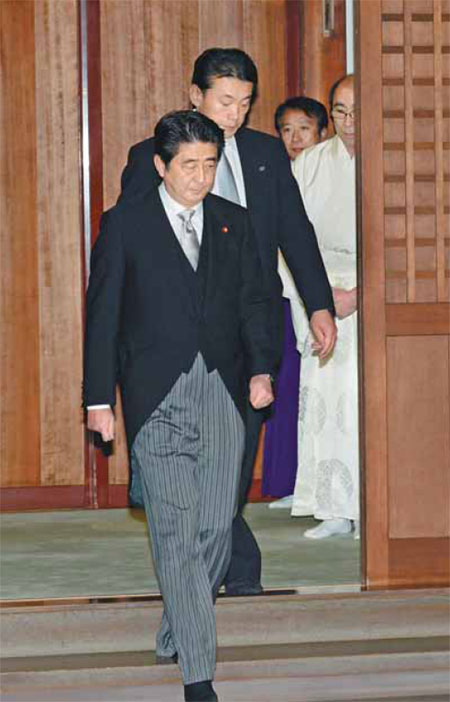Another Yasukuni visit stirs anger of Tokyo's neighbors
|
Japanese Prime Minister Shinzo Abe pays a visit on Dec 26 to the Yasukuni Shrine, which honors 14 Class-A war criminals of World War II and is considered a symbol of Japan's past militarism. Ma Ping / Xinhua |
Japanese minister pays homage at shrine only six days after Abe
A Japanese Cabinet minister's visit to the Yasukuni Shrine on New Year's Day further strained relations between Tokyo and its Asian neighbors, observers said.
Yoshitaka Shindo, Japanese minister of internal affairs and communications, made the trip just six days after Japanese Prime Minister Shinzo Abe visited the shrine. Abe's visit prompted worldwide criticism, including from the United States, Japan's key ally.
Shindo told Kyodo News Agency that his trip was a personal one and he was renewing a wish for peace. He said it was his sixth visit to the shrine since Abe assumed office a little over a year ago.
Chinese Foreign Ministry spokeswoman Hua Chunying expressed strong opposition to the visit on Wednesday, calling it another provocation by a Japanese Cabinet member.
She said it exposed Japan's war crimes and attempts to "challenge the outcome of the world's anti-fascist war", a development that China finds dangerous.
"The Chinese people and people of other Asian nations will not allow Japan to reverse history. We solemnly urge Japan to reflect upon history," she said.
The Yasukuni Shrine, where 14 Class A war criminals from World War II are honored, is regarded as a brutal reminder of Tokyo's imperialist past and wartime aggression.
Zhou Yongsheng, a professor at China Foreign Affairs University, agreed. "His decision to visit the shrine was made despite international condemnation, and we can tell that the Japanese government has chosen to stand on the opposite side of all peace-loving countries," he said.
Yang Bojiang, deputy director of the Institute of Japanese Studies at the Chinese Academy of Social Sciences, said Shindo has always been a pioneer in Japan's Liberal Democratic Party in pushing the act of glorifying criminal history.
Therefore Shindo's visit to Yasukuni Shrine is to show the Cabinet's support of Abe, Yang said.
In a New Year message published on Wednesday, Abe also reaffirmed his resolve to change Japan's pacifist post-World war II constitution, which limits Japan's military to self-defense, and said the document could be amended by 2020.
Analysts say rewriting the Constitution has always been Abe's ultimate goal.
Yang said Abe will amend the Constitution to let the "right to collective self-defense" - illegal under the existing official interpretation of the Constitution - be allowed by twisting the interpretation of the document, even though everyone knows the revision is illegal.
On New Year's Eve, Foreign Minister Wang Yi telephoned US Secretary of State John Kerry and Wang's South Korean counterpart, Yun Byung-se, to convey his alarm over Abe's Yasukuni Shrine visit.
"Our response is just and legitimate. We are safeguarding human conscience, internationally acknowledged axioms and the dignity of people of the invaded countries," Wang said during his conversation with Yun.
Wang had made three similar calls to his counterparts in Vietnam, Germany and Russia a day earlier.
Russian Foreign Minister Sergei Lavrov said Russia stands with China on the Yasukuni Shrine issue and opposes Abe's visit, deeming it a provocation to Japan's Asian neighbors. Lavrov urged Japan to correct its erroneous historical view and avert further moves that will hurt the feelings of the victims of Japanese aggression.
In a written answer to Kyodo News, Vietnamese Foreign Ministry spokesman Luong Thanh Nghi said he wishes Japan would deal with the issue in a proper way in the consideration of regional peace, stability and cooperation.
A newspaper in Germany, an ally of Japan in World War II, also suggested that Japan should face up to its history.
German newspaper Frankfurter Allgemeine reported that Abe's attitude, which is reflected by his behavior, is a cause for concern, and Japan under Abe wants to take a different path than one of universal values and human rights.
The newspaper said Abe has no intention to correct the mistakes Japan made in World War II, an attitude which is close to his nationalistic colleagues in and outside the ruling party.
Bruce Klingner, a senior research fellow at the Washington-based Heritage Foundation think tank, also criticized the shrine visit.
"Abe's trip is a serious foreign policy mistake that threatens allied security interests in Asia," Klingner told Xinhua News Agency.
Ren Jie, Zhou Wa and Xinhua News Agency contributed to this story.
qinjize@chinadaily.com.cn



















